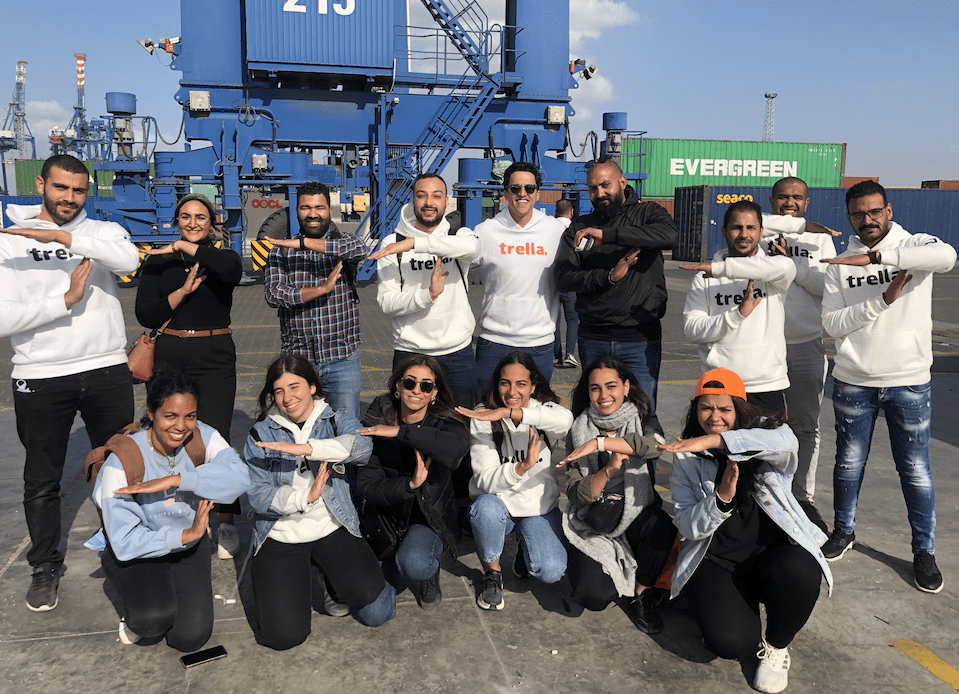With all the news of global supply chain challenges, it’s no wonder logistics and last-mile delivery services have become such big business in the agrifoodtech world. In Cairo, a city of 21 million people, it’s not just big: it’s huge.
“[We] are helping to solve some of the problems of the market’s fragmented supply chain management system,” says Omar Hagrass, CEO of Trella, a Cairo-based online freight marketplace.
Trella is among more than a dozen Egyptian startups to have secured VC backing to overhaul the country’s B2B logistics scene by digitalizing essential functions and eliminating unnecessary middlemen. It raised $42 million in June from Maersk Growth, Raed Ventures, and several other investors.
Other midstream startups that have secured funding in recent months include MaxAB, a food and grocery delivery service that raised $55 million in August; e-commerce platform Capiter, which raised $33 million in September; as well as Bosta ($6.7 million), Cartona ($4.5 million), and Fatura ($3 million).
“An enabling regulatory environment and smart incentives to promote digitization have made Egypt an attractive market for e-commerce companies,” says Monica Brand Engel, co-founder and managing partner of VC firm Quona Capital, which backed Capiter.
Digitalization trend
Until recently, commerce in Egypt has largely happened offline, and was dominated by small and informal retailers that shopped in person for most of their inventory – and whose customers shopped in person with them. A rapid rise in internet penetration, the arrival of 4G mobile technology, and a young population comfortable with making online purchases gave rise to supply chain digitalization – as has tens of billions of dollars in new transport infrastructure investments by the Egyptian government.
The Covid-19 pandemic supercharged this trend. E-commerce in the Middle East and North Africa has grown 35% since last year, with 80% of the $30 billion in sales happening in Egypt, the region’s most populous country. Electronics, fashion, and food delivery are the leading categories by volume, while e-grocery has grown the fastest, according to a study from Wamda and MIT’s Legatum Center for Development and Entrepreneurship.
The increase in online shopping has accelerated delivery services and digital payment services. “Digital features such as live routing, messaging updates, contactless delivery tech, and integrated platforms that cover everything from order fulfillment to completion have become the norm,” the study says.
Globally, e-commerce and e-grocery seem to go hand-in-hand with the acceleration of logistics tech and other midstream technologies. The biggest investment sectors in agrifoodtech for the first half of 2021 were e-grocery ($8.3 billion) followed by midstream tech ($3 billion), according to deal data from AgFunder [disclosure: AgFunder is AFN‘s parent company.]
“With the reduction of physical intervention being a crucial factor of survival, social distancing has created room for growth for supply chain startups,” says Trella’s Hagrass.
Defragmenting the supply chain
Digitalization and efficiencies are already yielding results across Egypt’s food value chain.
Take grapes, for example. Egypt is the fourth largest producer of grapes in the world; its supply has grown more than 18-fold in recent years because of improvements in the supply chain and technology’s acceleration of access to markets and finance, according to a report from the UN Food and Agriculture Organization.
Small and informal retailers, which handle the majority of consumer food sales in Egypt, are also benefiting by gaining access to online ordering applications, inventory delivery, digital payments, and other financial services.
Integration of financial services in a market where less than 40% of the population uses the formal banking system appears to be a key gain brought about by Egypt’s midstream tech sector.
Capiter’s investors were won over by the company’s “unique mix of logistics, financial services, and smart application of data [which] has allowed it to scale rapidly into a market leader,” Engel says. The company operates under a license by the Central Bank of Egypt.
“Our investors did not just evaluate us as a digital broker or trucking marketplace, but as a full-fledged logistics and financial services provider in-the-making,” Hagrass says of Trella.
Some observers express concern that Cairo is becoming overcrowded with B2B logistics startups (the fact that Capiter is among the only ones to have scaled beyond the capital was a draw for its investors, according to Engel.)
But while competition among startups is intensifying, large fast-moving consumer goods companies are struggling to keep up with consumer demand – and that’s buoying a diverse set of midstream solutions.
“Though there are strong economies of scale to this model,” Engel says, “it is not a ‘winner take all’ business.”





